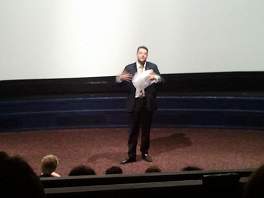
Jonathan Clements introducing Summer Wars
Kicking off the Scotland Loves Animation set of events was a showing of Summer Wars at the Glasgow Film Theatre. Organised by with the help from UK organisations such as Manga Entertainment, the Japan Foundation and Creative Scotland, it is the first in a series of films being shown at the GFT and later at the Edinburgh Filmhouse.
Having been earlier in the year to the UK premiere of Evangelion 2.0, it was familiar territory and the trip up from England wasn't as fraught as I had expected. The queue to enter the cinema was sizeable and with no allocated seats, I feared getting a good spot would be impossible. I was pleasantly surprised though to land in an almost central spot and for some seats to be left vacant.
Introducing the movie was the representative of Scotland Loves Animation, quickly followed by the imitable Jonathan Clements who, in signature style, relayed stories and thoughts on the upcoming film. They all centred around director Mamoru Hosoda, first starting with the inception of Summer Wars after the success of The Girl Who Leapt Through Time: a difficult project to approach when Hosoda's previous film was based on an already successful Japanese teenage novel. The decision to create something entirely new was bold but the results speak for themselves. Anecdotally it was spawned from Hosoda's marriage after TGWLTT was released and the inaugural visit to his wife's family – Hosoda himself an only child, ostensibly raised by his grandmother, to be thrust into a world of cousins, uncles, aunts, grandmas and distant relatives.
Jonathan described the film as a kind of “secular Christmas film” - containing all of the heartfelt elements we as westerners expect from such a film, but without the yuletide setting. This led onto the background of some of the elements of the film such as the yearly baseball tournament as well as the movie's setting – Ueda - and its significance to both Hosoda in growing up and the battles the town has seen, including one in the early 1600's which the locals believe entirely changed the path of Japan's history. Also mentioned was the obscure card game Hanafuda which plays a pivotal role in the film and how it is a subtle reference to one of the film's sponsors: Nintendo. Continuing the theme of old and new, young and old, Nintendo's own history started out with producing the card game before evolving into the powerhouse it is today.
From there it was on to Jonathan's most divisive comment, describing Summer Wars as “Ghost in the Shell for the Facebook generation”. His argument being that the story of both films – a sentient AI causing havoc for all – is the same is ostensibly true, but seemed to miss the subtleties of both productions and felt like too much of a reduction to be anything more than a sound bite. Regardless, his knowledge and ability to tell a story was in full swing and I look forward to hearing more from him over the coming days with further introductions to films.
Summer Wars itself is no less brilliant upon rewatching and is best seen big and loud and with an amenable audience. The juxtapositions, historical versus modernity, youth over wisdom, were all the more obvious but it was the individual shots which I seemed to appreciate more. The long pan after the Grandma's death is close to icon, closely followed by the furtive hand holding by Kenji and Natsuki which brilliantly captures that shy sensation of a first love. The visual quality cannot be applauded enough, whether it's Madhouse's sublime visuals or Takashi Murakami's kaleidoscopic explosion in the world of OZ – supposedly the name of a defunct supermarket chain that served as one vertex of a young Hosoda's triangle of flat, work and food. It says so much that a beautifully keyframed sequence of animation doesn't look out of place, compared to the slideshow's many TV series fall to. Unfair perhaps to compare big-budget movies and TV series but quality stands by itself.
As a starter to two weekend's worth of films, talks and interviews, Summer Wars couldn't have been more perfect.
Movie was great, Mamoru Hosoda really seems like the kind of up and comer the anime industry needs right now.